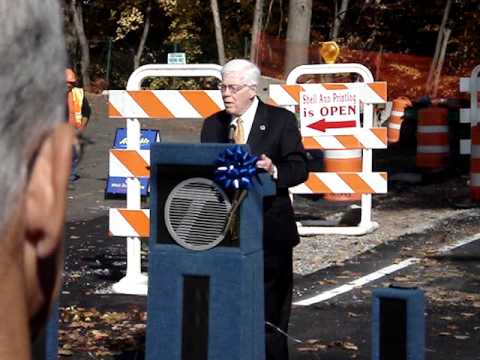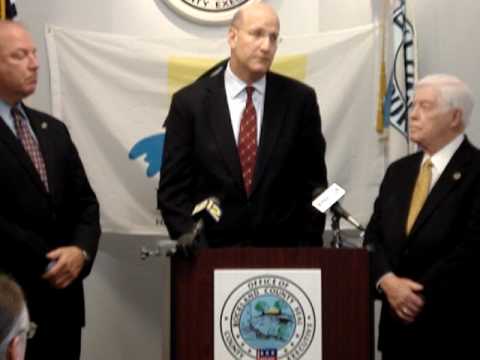
Senate Unveils $1.3 Billion Small Business Assistance Package
Senator Thomas P. Morahan announced a Senate Majority Conference small business and manufacturing assistance plan that targets the biggest concerns that hold back small businesses from growing and creating new jobs. The plan would provide $490 million in assistance in the first year and almost $1.3 billion in tax relief and assistance to small businesses when fully implemented after three years.
"We need to continue to do more to help businesses, especially small businesses, create good-paying jobs," Senator Morahan said. "This small business assistance package will lower taxes, provide new economic incentives, streamline red tape and bureaucracy and make it much easier for young people and families to stay here because they will see a future here."
The Senate plan would eliminate the corporate income and franchise tax for manufacturers; provide direct property tax relief checks to small businesses; provide tax relief for businesses that pay personal income tax; provide tax credits for the costs of energy; and cut State red tape and bureaucracy.
There are almost half a million small businesses (fewer than 100 employees) in New York State, with 70 percent of them employing ten people or less. The majority of new jobs created in New York are created by small businesses.
The Senate small business assistance plan includes:
> Eliminating the income tax and corporate franchise tax on manufacturers, regardless of size, providing $550 million in tax relief;
> A $350 million refundable tax credit to help 386,000 small businesses, that employ 20 people or less, with rising energy costs;
> Reducing Corporate Franchise Tax rates from 7.5 percent to 6.85 percent, saving businesses $150 million;
> Creating a Small Business STAR program to provide direct rebate checks, averaging $700, to small businesses that pay school taxes and employ less than 20 people, providing $150 million in property tax relief;
> Expanding incentives to encourage emerging technology companies that do research and development in New York, to also manufacture their products in New York;
> $20 million in relief through reforms of the corporate franchise tax; and
> Relief from red tape and bureaucracy by simplifying and reducing paperwork, eliminating unnecessary or overly burdensome fees and permits, and creating a one-stop shopping information center to help someone start or expand a small business in New York.
New York is one of the most diverse economies in the world, with strong financial, tourism, manufacturing, production, and agriculture sectors. The current economic development programs often due not reflect the diversification of the State’s economy. The Senate will convene public hearings to address the restructuring of the economic development programs to embrace the diversity in New York's economy with a more regional and sector approach to job growth and retention. In addition, the Senate Majority will convene public hearings to address the need to simplify the tax code.
The Senate Majority has initiated tax cuts and reductions that have provided taxpayers with a cumulative savings of more than $126 billion. This package would build on the Senate’s record by specifically targeting small business job growth.
The Senate Majority small business assistance plan includes the following:
Cutting Business Taxes
According to a recent Business Council document "Benchmark New York State," corporate income taxes in New York State are 133 percent above the national average. The Senate business tax cut and assistance package would:
Eliminate Income and Corporate Franchise Taxes on Manufacturing
-- This proposal would eliminate taxes on business income for manufacturers whether a manufacturer files as a corporation under Article 9-A or as a partnership or limited liability company under the Personal Income Tax (Article 22). It is estimated that this proposal to eliminate these taxes would save manufacturing companies in New York $550 million annually.Reduce Corporate Franchise Tax Rates
-- Reduce the net income rate from 7.5 percent to 6.85 percent over a three year period. This reduction in taxes would have a positive affect on all businesses, while attracting new businesses, supporting existing businesses and creating more jobs. This would save New York companies $150 million annually.Small Businesses STAR Property Tax Rebates
-- This plan establishes a Small Business STAR program that would provide direct property tax rebate checks to small businesses that pay school property taxes and employ less than 20 people. Much like STAR and the STAR rebate program, businesses will be able to get a rebate check on the school taxes paid on the first $30,000 of market value of their business property. It is estimated that the average rebate check would be $700, with a value of $150 million in property tax relief.Eliminate S-Corp Differential (Eliminate Multiple Tax Calculations)
-- Although many small businesses pay income taxes under the personal income tax, they are required to compute their tax as if they paid under the corporate franchise tax. These businesses are required to pay a differential equivalent at the fixed dollar minimum under the corporate franchise tax resulting in duplicative and redundant tax calculations and filings. This proposal would eliminate this tax on the State's small businesses. This would afford New York's small businesses $20 million to invest in the New York economy and eliminate this burdensome computation and filings. As a result, small businesses would only be subject to the personal income tax as they are in a majority of the other states.Commercialization of Centers of Excellence and Genesis Centers Research
-- The Senate is proposing an initiative that will bridge the divide between State-sponsored Research and Development and manufacturing in New York State. The current tax law penalizes companies that have created R&D jobs in the State from manufacturing in New York State. The Empire Zone program does not afford those companies to be treated as a new business, discouraging expansion in the State.At a time when the company is looking to expand in New York, the tax code should encourage a company to continue to expand and invest in New York. A business that is connected through the State’s premier academic and business incubators for research and development will now be afforded refundable wage and investment tax credits to lure the manufacturer of that advanced technology to the State.
Reducing Business Costs
The Senate advanced several proposals to reduce the cost of doing business in New York State, including:
Energy Cost Assistance
-- Energy costs were cited by 41 percent of the Business Council survey as one of the top four concerns. Benchmark indicates that energy costs are 58 percent above the national average. Small business owners have cited increasing energy costs as one of the biggest problems they face in staying competitive. The Senate small business plan would address that concern by providing a $350 million refundable tax credit program that would help 386,000 eligible small businesses across New York State afford the rising cost of energy. Under the plan, a business with 20 or fewer employees can receive a credit of two cents per Kilowatt Hour (KwH) that would be applied directly to eligible businesses' tax liability, while businesses that do not owe taxes would receive a rebate check.Relief from red tape and improved customer service for small businesses
-- The Senate Majority small business assistance plan would simplify the regulatory burden on small businesses, substantially reduce their paperwork, produce "one-stop shopping" to start or expand a small business, and eliminate unnecessary or overly burdensome fees and permits. The plan would:> Expand New York State’s existing Online Permit Assistance and Licensing (OPAL) program to cover all New York State departments, agencies and authorities that require permits, registrations and fees. The Department of State would cooperate closely with the Governor’s Office of Regulatory Reform to ensure that all agencies participate through OPAL. In addition, the Department of State would ensure that a potential business can make all applications at one time and make all payments for initial registration electronically.
> Any ongoing fees, registration filings or assessments placed on a business in New York State, after the initial year of placement, will be filed as part of the business’s annual State Tax filing. Businesses could pay all applicable State fees and costs at one time, rather than pay them at different times throughout the year. An electronic filing option will be granted to every such taxpayer at no additional charge.
> The State would create a demonstration "511" service to provide small businesses with one easily accessible number to direct questions and provide assistance to small businesses looking to open or expand in New York State.
Additional Businesses Tax Relief and Incentives
Businesses in New York not only pay income taxes, but pay taxes in many other forms. The Senate has drafted, as a part of our SFY 2006-07 tax package, several proposals to further ease the tax burden on the state’s businesses.
Sales Tax Exemption for Businesses Located in Academic Incubator Facilities -
- Companies located in academic incubator facilities would receive a state sales tax exemption for the purchase of equipment costing $500 or more. Localities would be able to opt into this exemption as well. These companies, by nature, are small and have limited resources. The sales tax exemption would reduce equipment costs, which can be an impediment to the success of these small businesses. This proposal would save companies $500,000 annually in state taxes and twice that if all localities opt into the exemption.Refundable Tax Credit for Farms
-- The Senate plan would eliminate the Alternative Minimum Tax for farms and make the investment tax credit refundable; providing $2 million in critical capital to the State’s farm community. Many of the state’s farmers do not make enough profit to utilize the investment tax credits that they have already earned.Expansion of the Farmer’s School Tax Credit Program to leased farmland -
- Under current law, a farmer must own real property in order to qualify for the farmer’s income tax credit for money paid for school property taxes. This proposal would extend eligibility of the Farmer’s School Tax Credit Program to include agricultural lands that are leased for at least five continuous years. The extension of the tax credit would not only provide $2 million in tax relief for New York’s Agricultural industry, but it would also enhance access to farmland and open space preservation in the State.Eliminate Petroleum Business Tax (PBT) on Non-Residential Heating Fuel
-- Current law provides a full exemption from State taxes on petroleum fuel sold for residential heating purposes and a partial exemption for petroleum fuel sold for nonresidential heating purposes. In an effort to continue to provide relief to businesses in our State, this part would fully exempt petroleum fuel sold for nonresidential heating purposes. It would further reduce energy expenses for small businesses by $7 million annually.####

